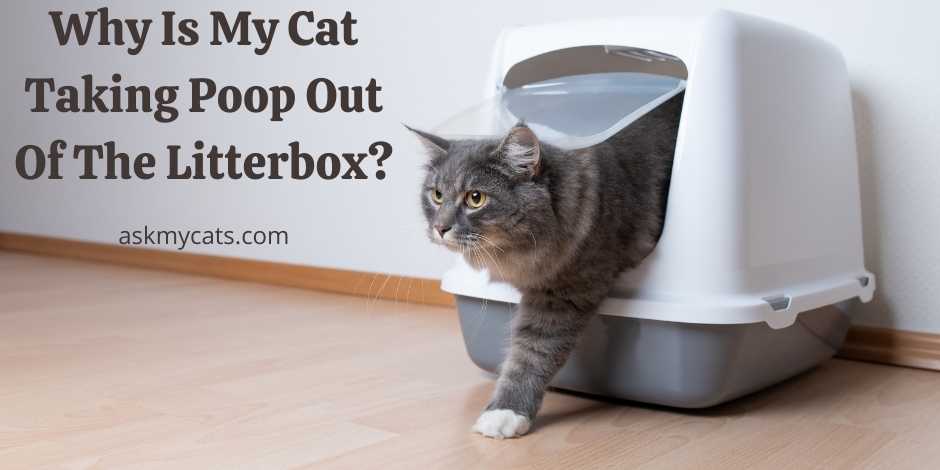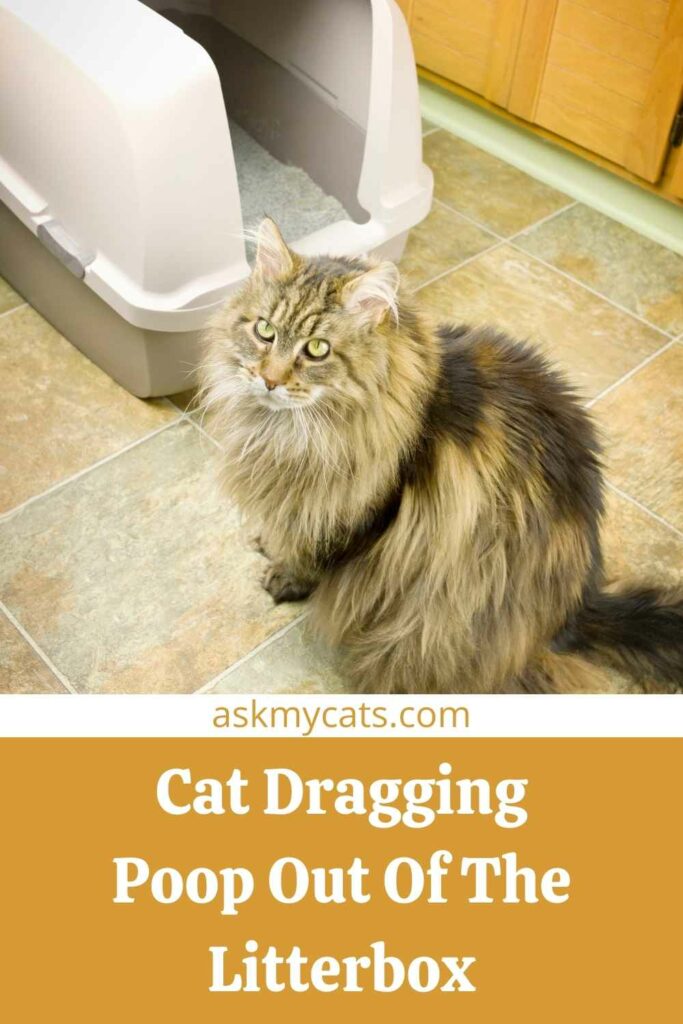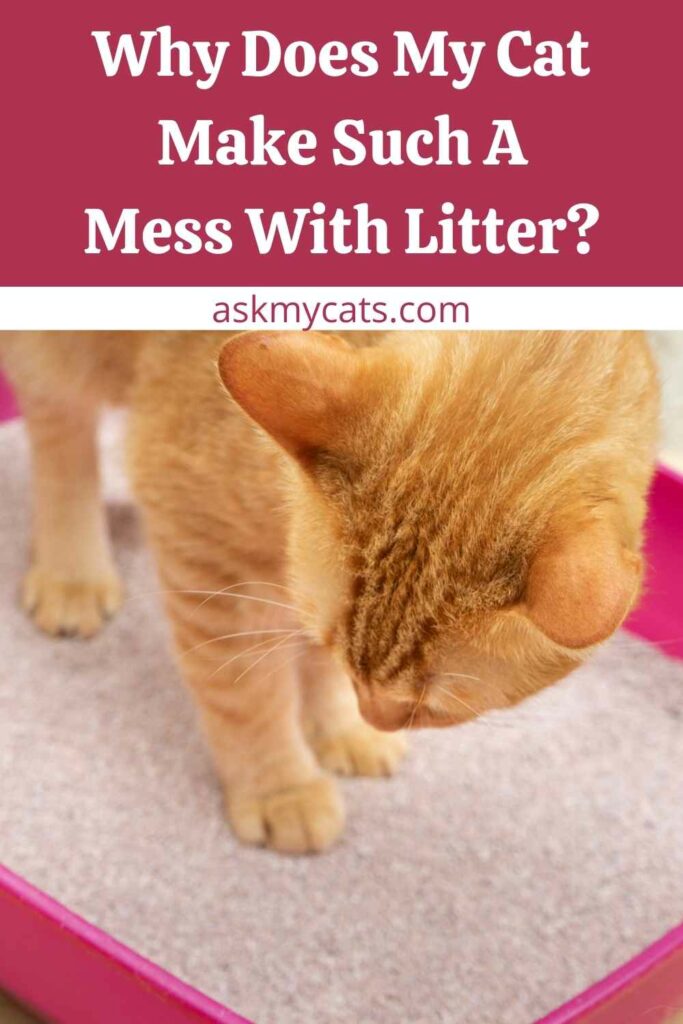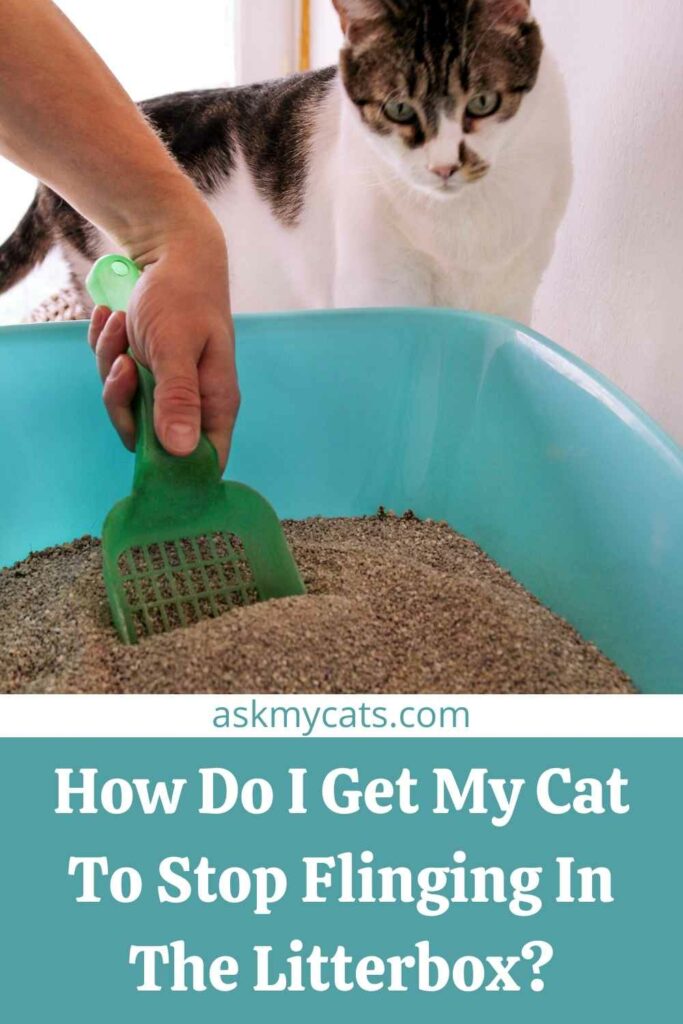Cats have a natural inclination to hide excrement. It helps them evade predators in the wild and avoid confronting more dominant cats in the region. Cats, on the other hand, are mostly neat creatures.
If at all possible, they will avoid making a mess and contaminating their house. It’s time to confront your cat’s habit of dragging excrement out of its litter box.
A cat removes its poop from the litter box to bury its poop underground because of the pheromones in their poop; cats have a natural inclination to bury it. Since aroma of it might attract predators, they bury it to lessen the stink.
In this article, we are going to discuss the reasons why cats take poop out of the litterbox.


Give Your Cat the Perfect Day
Get the Free Ebook!
Cat Dragging Poop Out Of The Litterbox
When the litter box is too tiny or unclean, cats may drag their poop. They like to defecate in a hidden and peaceful location, thus if the box is in an odd location, they will depart before completing poop.

Dragging poop out may be unintentional for cats with movement limitations. They may also be incontinent, unable to wipe the excrement away from themselves or hide the waste. As they step in it or walk in it, this tracks excrement all over the place.
Bored or anxious cats will defecate outside of their litter box. Cats will utilize dried excrement as a toy or a technique to seek attention if they are pushed to their limits.
To feel safer and more comfortable, stressed cats may try marking their territory with excrement. Stray and old cats have a hard time learning to use the litter box and end up spreading excrement unintentionally.
Cats will be more vigilant at masking their own excrement in a multi-cat household where waste can accumulate. As a result, if your cat uses the toilet outside of the litter box or tracks excrement around the home, it’s most likely because the litter box is too unclean.
Cleaning your cat’s litter box once a day, or more if possible, is suggested. Approximately 9 times out of 10, this will resolve your cat’s litter box issue.
According to Behavioural Patterns, cats prefer a clean litter box over a filthy one. This is especially true if there is any visible excrement or urine.
Felines are tidy creatures who groom themselves on a regular basis. Spending time in the presence of open garbage is a bad method to keep their neat and tidy appearance.
Why Does My Cat Make Such A Mess With Litter?
Cats make a mess with litter because of poor litterbox habits and lack of grooming at an early age.

When cats are young, their moms teach them about grooming and litter box routines. You’ll need to educate a kitten or stray adult cat how to use the litter box correctly if you adopt one.
If your cat is pooping outside of this area, it may require some training on where to find and use the litter box.
If your cat does not hide its waste, the situation will become even worse. It’s possible that it’ll tread on it and trail it around the home. Your cat may need to be taught how to hide its excrement in this scenario.
Sitting with your cat as it uses the litter box is a good way to achieve this. After it has been done, gently grasp its paw and assist it in cleaning the feces.
If your cat is aged, crippled, or fat, it may unintentionally track excrement outside of the litter box. Your cat may get feces on its hair when defecating, especially if the feces are watery. If your cat has movement limitations, it may not be able to clean up after itself.
Arthritic and obese cats will have a hard time with this. Long-haired cats can also benefit from this. When they become older, they may get excrement in their buttfur and struggle to get it off.
You’ll need to assist your cat in grooming to solve this issue. Wipe its fur with an unscented moist wipe, paying special care to its butt. Remove any waste that your cat is unable to reach.
A pheromone found in a cat’s excrement is used to identify the owner. As a result, cats utilize excrement to define their territory.
Cats do this with urine most of the time and unfixed males are known for spraying the walls. If they’ve been fixed and can’t utilize this strategy or if they’re female they’ll have to think of something else. Their preferred method of disposal will be poop.
If your cat is doing this, another kitty may be around. To ward off the challenger, your pet will mark its territory. You can stop the activity by chasing the other cat away or closing the door until the odor goes away.
Similarly, a cat attempting to stake a claim to a territory would leave its crap out in the open to identify its territory.
Felines don’t have a strict hierarchy, although they may be fiercely protective of their territory and resources when necessary. Pooping in the open is a safe and indirect technique of demonstrating authority.
Other cats are welcome to question this territorial claim, but this may result in conflict. If the other cats aren’t ready for the fight, they’ll hide their waste to avoid confronting the other cat.
Cats consider their owners to be the dominant cat in a regular family. They don’t want to fight you; therefore they’ll hide their excrement to avoid causing an issue.
If your cat is willing to test you by leaving its excrement all over the place, it is most likely anxious.
It feels frightened and crowded, so it’s doing its best to keep you away without fighting. This is especially true if you bring home a stray or adopt an adult cat who hasn’t yet settled in.
If your cat is bored and doesn’t have any appropriate toys, it may resort to using the litter box. It will make do with a chunk of dry excrement for now. The cat is almost likely bored if you constantly discover huge chunks of excrement throughout the home.
Similarly, if your cat wants your attention, it may begin pulling excrement from its litter box. It is intelligent enough to recognize that this is inappropriate conduct, and it will respond accordingly. It reacted even if you just cleaned up the excrement and ignored the cat again.
It will be unpleasant to reprimand or chastise the cat, but it is preferable to be ignored.
Make sure your cat has plenty of toys to remedy this problem. Increase the amount of time you spend playing with your cat. If you observe your cat playing with its own excrement, wipe it up, clean its paws, and replace it with a toy.
You must be interested to know about how to clean poop off kitten paws
Why Is My Cat Dragging Poop?
Cat drags poop everywhere because they want to isolate their poop.
Even if the cat is bored, agitated, or marking its territory, the excrement will be kept separate. It’ll most likely be strewn throughout the litter box. There are three plausible causes for discovering cat excrement all over the house:
- Since your cat does not conceal its poop, it walks on it when exiting the box and tracks poop around.
- Your cat has bowel obstructions, which causes it to leave a mess wherever it goes.
- Your cat is in pain when he uses the litter box.
- The litter box is either too tiny or too unclean.
Why Is My Cat Flinging Poop?
A cat is flinging his poop here and there due to anal problems faced by him.
Your cat may be constipated if you continually discover little chunks of excrement throughout the home. Because bowel motions are uncomfortable in this scenario, it feces whenever it can and whenever it feels the desire.
Because its digestion is messed up, everything it passes will be little or irregularly shaped.
In addition, your cat may experience bowel incontinence or leaking anal glands. As a result, it emits waste in an unanticipated and uncontrollable manner.
It is advised that you take your cat to the vet if it has one of these issues. It will require therapy in order to feel better and resume normal restroom habits.
How Do I Stop My Cat From Dragging In The Litterbox?
You should change the litterbox or clean it thoroughly to stop your cat from dragging in the litterbox.
If litter becomes glued to your cat’s paws, consider using a mat that lifts the litter off and keeps it restricted to the mat rather than dragging it about your house.
Some carpets hold litter better than others, but keep in mind that litter can occasionally attach so tightly that a vacuum isn’t powerful enough to remove it.
Long-haired cats have greater litter tracking concerns because litter gets trapped in their fur. To avoid this, clip the hair between their paw pads using blunt-tipped scissors or an electronic facial hair trimmer to a shorter length.
One of the more basic but effective ways to reduce litter tracking is to purchase a litter box with higher walls so that less litter is kicked out of the box and spreads around your home.
If you have an elderly cat, keep in mind that they may not be able to jump over high edges, so buy a box with an entry point for simpler access.
How Do I Get My Cat To Stop Flinging In The Litterbox?
You should purchase litter box mats to place outside the box. This will capture any litter or excrement before it reaches your flooring.

The mats will keep your home neat while the cat learns how to use the litter box properly.
You should also provide hands-on training for your cat. When your cat appears to be in need of a poop, place it in the litter box. The trash can then be gently buried using the cat’s paws and praised for a job well done.
Cleaning the litter box more frequently is much advisable. Because cats dislike unclean litter boxes, it is advised that they be cleaned at least once every day.
You must purchase more litter boxes. It is advised that one box be provided for each cat, plus one extra.
Alter the type of trash you’re utilizing. Your cat may be frightened off by the texture or fragrance of the litter, forcing it to depart the box without covering its waste.
Relocate the litter boxes to a more secluded, peaceful area. Your cat may see the litter box as hazardous, causing it to escape shortly after using it.
Assist your cat in grooming. If your cat has movement limitations, use an unscented damp wipe to assist it clean its buttocks and hair.
When litter does not clump right away, cats frequently tread in a wet litter, which adheres to dry litter and tracks it out of the box. Litter that clumps quickly will assist to prevent this and decrease tracking.
Frequently Asked Questions
Why won’t my cat bury his poop?
A cat may not cover his excrement because the litter irritates his paws or because he dislikes the scent or feel of it. So experiment with different types of litter, such as pine needles, shavings, and granules. You may also experiment with fragrance-free litter. Litter granules may become entangled in the fur that protrudes from long-haired cats’ paws.
Why does my cat poop on the side of the litter box?
Cats defecate (or pee in enormous pools) in inappropriate places for one of two causes. They don’t like their litter box, or they prefer their new forbidden toilet. Perhaps the litter isn’t deep enough, or the liner is difficult to navigate, or the box is too tiny — it should be 1.5 times the length of the cat.
Why does my cat dig in the litter box so much?
If you have more than one cat that uses a litter box, territorial competition may push them to spend more time scratching, digging, or rolling in order to leave their smell and mark their area.
Final Words
Your cat’s litter-box habits are one of the most obvious indicators of good or bad health. Be thankful that you spotted another symptom early or that it persisted to alert you to a concealed problem.
Maybe your cat is learning how to use the litter box properly, but it’s taking longer than intended. Box training is very difficult for older cats and stray cats.
Leave your questions in the comments section below.
